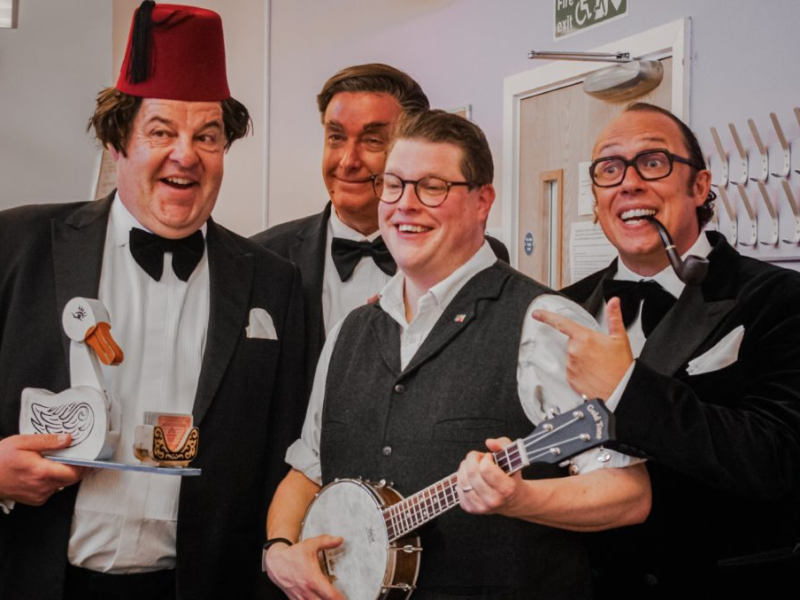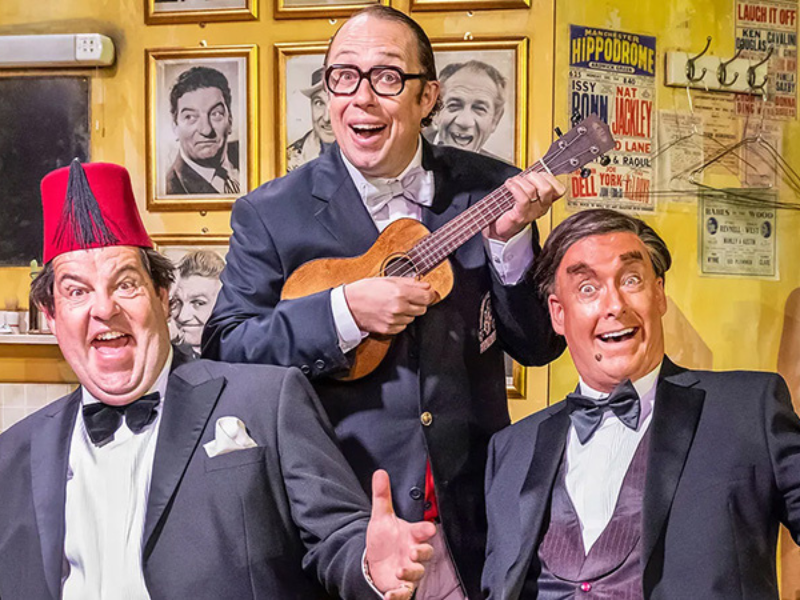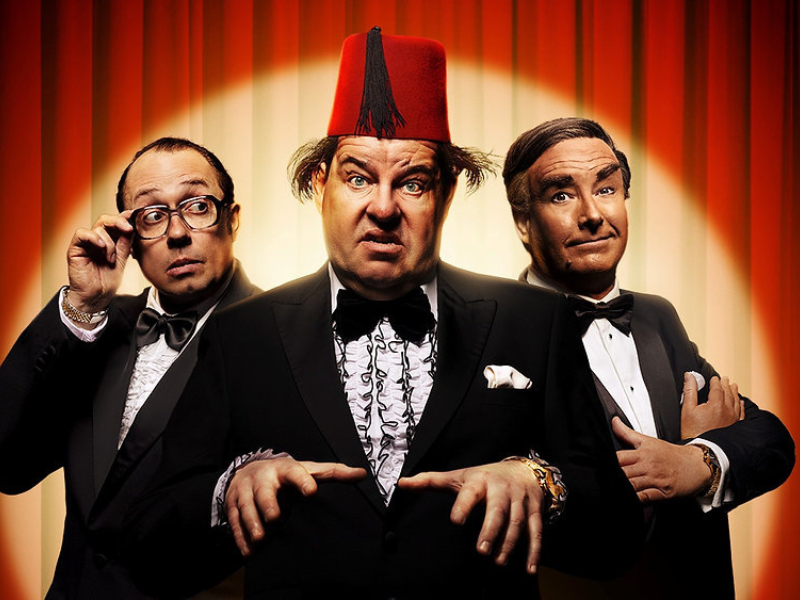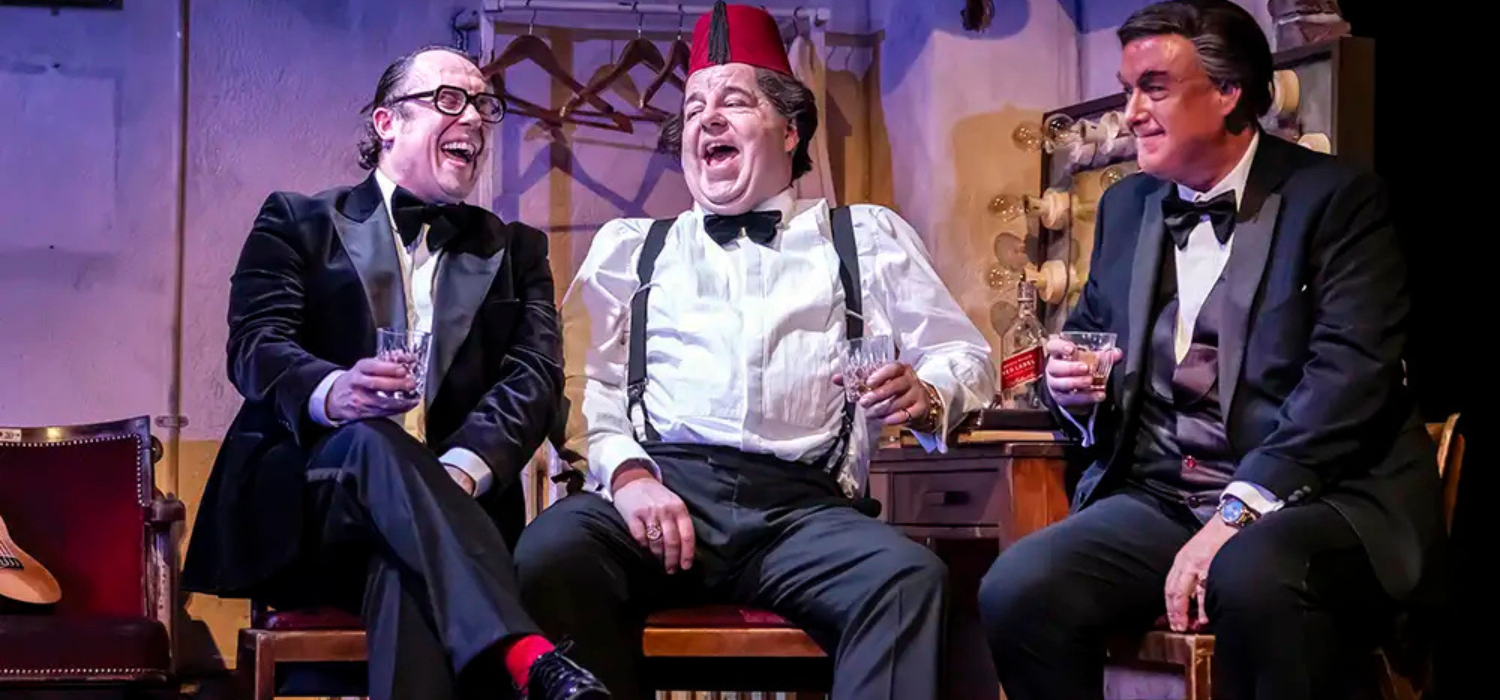Introduction: Why British Comedy Matters
Comedy has always been more than just entertainment. It is a reflection of culture, society, and the human condition. In the United Kingdom, comedy has long been regarded as one of the country’s greatest cultural exports. From witty satire and slapstick to sharp stand-up and surreal sketches, British comedy has consistently influenced global humor. What sets it apart is its ability to blend intelligence with silliness, social critique with entertainment, and timeless characters with unforgettable punchlines.
While Hollywood might be known for glitz and glamour, the UK is often credited as the birthplace of comedy styles that reshaped television, film, and live performance. Names like Charlie Chaplin, Peter Sellers, Rowan Atkinson, and Monty Python have not only defined eras of humor but also crossed borders, proving that laughter is a universal language. The legacy of UK comedy icons is not simply about jokes; it is about shaping culture, offering relief in difficult times, and leaving behind characters that generations will continue to adore.
Charlie Chaplin: Silent Comedy’s Global King
When discussing comedy icons, the journey must begin with Charlie Chaplin—the boy from London’s tough Southwark district who went on to become one of the most recognizable faces in cinema history.
Chaplin’s character, The Tramp, with his bowler hat, cane, and distinctive walk, remains one of the most enduring figures in comedy. What made Chaplin revolutionary was his ability to tell stories that were both hilarious and deeply human without uttering a single word. His silent films such as The Kid (1921), City Lights (1931), and Modern Times (1936) combined slapstick with poignant social commentary.
Chaplin’s comedy was not just about pratfalls and funny faces—it was about showing the struggles of ordinary people in a rapidly industrializing world. His genius lay in making audiences laugh one moment and tear up the next. Even today, nearly a century later, Chaplin’s work continues to resonate across cultures, reminding us that humor can transcend language and time.
Chaplin’s journey from London stages to global stardom laid the groundwork for the idea that British humor could conquer the world.
Peter Sellers and the Art of Character Comedy
Fast forward to the mid-20th century, and another British comedy icon emerged: Peter Sellers. Known for his remarkable ability to disappear into characters, Sellers brought to life some of the most eccentric and beloved roles in film history.
- In The Pink Panther series, his portrayal of the bumbling Inspector Clouseau made audiences roar with laughter. His physical comedy, clumsy timing, and exaggerated French accent remain unforgettable.
- In Dr. Strangelove (1964), Sellers played not one, not two, but three different roles, showcasing his range and sheer comedic brilliance.
What set Sellers apart was his versatility. He could move from slapstick to dark satire effortlessly, making him one of the most respected comedians of his era. Unlike Chaplin, who was primarily rooted in silent comedy, Sellers thrived in the era of sound, accents, and dialogue-driven humor.
Sellers’s influence can be seen in countless comedians who followed, especially those who embrace character-based humor and satire. His ability to embody larger-than-life personalities while maintaining comic timing proved that British comedy had an endless capacity for reinvention.

The Rise of Monty Python and Surreal Humor
If Chaplin gave the world silent laughter and Sellers showed the brilliance of character work, Monty Python redefined comedy entirely. Emerging in the late 1960s, the comedy group—consisting of John Cleese, Eric Idle, Michael Palin, Graham Chapman, Terry Jones, and Terry Gilliam—introduced a new brand of humor: absurd, surreal, and unapologetically bizarre.
Their television show, Monty Python’s Flying Circus, broke all the rules. Sketches didn’t always have punchlines; they often ended abruptly or transitioned into animated sequences by Terry Gilliam. The troupe thrived on randomness, intellectual satire, and poking fun at British traditions, politics, and class systems.
Films like Monty Python and the Holy Grail (1975), Life of Brian (1979), and The Meaning of Life (1983) became cult classics. Their humor was not just funny but also daring—often controversial yet deeply influential.
What Monty Python achieved was more than just laughter; they created a movement. Their work influenced American shows like Saturday Night Live and inspired countless comedians around the globe. Surreal humor, absurdism, and meta-comedy became mainstream because of Monty Python’s groundbreaking approach.
The Foundation of a Comedy Legacy
By the time Monty Python had cemented its place in pop culture, British comedy had already evolved from silent films to character-driven narratives to surrealism. Each era produced icons whose work transcended national borders and spoke directly to the human experience.
- Charlie Chaplin showed that laughter could be universal and timeless.
- Peter Sellers demonstrated the artistry of performance through character transformation.
- Monty Python proved that comedy could be intellectually challenging and completely unpredictable.
Together, these legends laid the foundation for future generations of British comedians and actors who would go on to redefine global humor.
Rowan Atkinson: The Silent Genius of Modern Comedy
Few comedians have managed to capture global audiences with so little dialogue as Rowan Atkinson. Born in County Durham, Atkinson became an international sensation thanks to his iconic creation, Mr. Bean.
What made Mr. Bean extraordinary was its universal appeal. Atkinson relied on exaggerated facial expressions, physical mishaps, and childlike mischief rather than words. The character could be understood in London, Tokyo, or New York without translation. Television episodes of Mr. Bean became instant classics, and the two feature films (Bean in 1997 and Mr. Bean’s Holiday in 2007) grossed hundreds of millions worldwide.
But Atkinson’s comedy genius extended beyond Mr. Bean. His performances in Blackadder, a historical sitcom spanning multiple eras, displayed sharp wit, biting sarcasm, and clever wordplay. In contrast to the silent slapstick of Mr. Bean, Blackadder relied on cutting dialogue and satirical takes on history. This duality—between physical comedy and intellectual humor—proved Atkinson’s versatility and secured his place among the greatest comedy icons.

John Cleese: The Master of Satire and Absurdity
Although Monty Python was a group effort, one of its most recognizable figures was John Cleese. His tall frame, stern expressions, and impeccable timing made him a natural for sketch comedy, but Cleese’s career extended well beyond the troupe.
His sitcom, Fawlty Towers, co-written with his then-wife Connie Booth, is often considered one of the greatest British sitcoms of all time. Cleese’s portrayal of Basil Fawlty, the rude, incompetent, and endlessly frustrated hotel manager, became legendary. The series only ran for 12 episodes across two seasons, yet it left a permanent mark on television comedy.
The genius of Cleese lay in his ability to blend absurdity with biting social commentary. Whether as a member of Monty Python or as Basil Fawlty, Cleese highlighted the ridiculousness of authority, class structures, and human behavior. His influence remains visible in sitcoms worldwide, from Seinfeld to The Office.
Dawn French and Jennifer Saunders: Queens of Sketch Comedy
Comedy in the UK has long been dominated by male figures, but Dawn French and Jennifer Saunders broke through to become legends in their own right. Together, they created the sketch show French and Saunders, which ran from the late 1980s through the 2000s.
The duo became famous for their sharp parodies of popular culture, from Hollywood blockbusters to pop music videos. Their chemistry, timing, and fearlessness in lampooning even the biggest celebrities made them household names. Unlike many sketch comedians, they also used their platform to highlight female perspectives, something that had been underrepresented in comedy.
Individually, both French and Saunders achieved success:
- Dawn French starred in the hit sitcom The Vicar of Dibley, where she played the lovable and progressive female vicar in a traditional English village.
- Jennifer Saunders created and starred in Absolutely Fabulous (Ab Fab), a satirical take on fashion, celebrity culture, and excess that became a cultural phenomenon.
Together and apart, they proved that women could not only succeed in comedy but dominate the industry with originality and flair.
Eddie Izzard: The Surreal Storyteller
Among the most unique British comedians of modern times is Eddie Izzard, whose stand-up comedy blends surreal observations, history lessons, and sharp improvisation.
Eddie’s performances are often described as “comedian as philosopher,” moving from topics like ancient history and religion to modern life with a stream-of-consciousness style. Shows such as Dress to Kill (1999) and Glorious (1997) won international acclaim and helped Eddie break into the American market.
Beyond comedy, Eddie’s openness about identity has also been groundbreaking. As a gender-fluid performer, Eddie challenged traditional norms in comedy, paving the way for inclusivity and diversity in the industry.
The impact of Izzard’s comedy lies in showing that laughter can come from anywhere—whether it’s the Roman Empire, God, or shopping at the supermarket—and that comedy could be both deeply intelligent and completely absurd.
Billy Connolly: The Big Yin of Stand-Up
No celebration of UK comedy icons would be complete without Billy Connolly, often referred to as “The Big Yin.” Hailing from Glasgow, Connolly’s stand-up comedy revolutionized live performance in Britain.
Connolly’s style was conversational, storytelling-based, and filled with warmth. Rather than delivering punchlines, he would take audiences on long, hilarious tangents, weaving personal stories with observations about everyday life. His Scottish accent, colorful language, and larger-than-life personality made him instantly distinctive.
In addition to his stand-up success, Connolly also became a respected actor, appearing in films like Mrs. Brown (1997) and The Last Samurai (2003). Yet it was his live comedy that made him a legend, influencing generations of stand-ups around the world.
What makes Connolly’s legacy particularly powerful is how he balanced humor with humanity. Even in later years, as he battled Parkinson’s disease, he continued to embody resilience and positivity, proving that laughter can be the greatest form of strength.
Michael McIntyre: The Everyman of Stand-Up
In the world of stand-up comedy, Michael McIntyre has become one of the UK’s most successful exports. Known for his energetic stage presence, observational humor, and family-friendly style, McIntyre connects with audiences through relatable stories about everyday life.
His tours consistently sell out arenas, making him one of the highest-grossing comedians in the world. Specials like Showtime (2012) and Big Show on BBC television further cemented his mainstream appeal.
McIntyre’s strength lies in his accessibility. While some comedians rely on edginess or controversy, McIntyre finds laughter in universal experiences—parenting struggles, awkward social encounters, and the quirks of modern living. His legacy lies in proving that clean, relatable comedy can be just as powerful and successful as provocative humor.
Ricky Gervais: Redefining Comedy with Brutal Honesty
When Ricky Gervais co-created The Office in 2001, few expected it to revolutionize television comedy. Shot in a mockumentary style, the series followed the mundane yet absurd lives of office workers at a paper company in Slough. Gervais’s portrayal of David Brent—a clueless, self-absorbed boss—became one of the most iconic characters in modern comedy.
The brilliance of The Office lay in its realism. Unlike traditional sitcoms filled with laugh tracks and over-the-top characters, Gervais’s approach was subtle, awkward, and painfully funny. The show resonated with audiences worldwide and spawned international adaptations, most famously the American version starring Steve Carell.
Gervais’s comedy often treads into controversial territory. His stand-up specials, including Animals (2003) and Humanity (2018), feature sharp observations, provocative jokes, and fearless commentary on taboo subjects. His hosting of the Golden Globe Awards also became famous (and infamous) for skewering Hollywood elites with razor-sharp wit.
Love him or hate him, Gervais reshaped comedy for a new era—highlighting the humor in discomfort, truth, and the everyday awkwardness of life.

Stephen Fry and Hugh Laurie: The Brilliant Duo
Before they became household names individually, Stephen Fry and Hugh Laurie rose to prominence as one of Britain’s most beloved comedy duos. Their sketch series, A Bit of Fry & Laurie, ran from 1989 to 1995 and showcased their remarkable intelligence, wordplay, and absurd humor.
- Stephen Fry became synonymous with wit, intellect, and eloquence. Beyond comedy, Fry became a writer, presenter, and advocate for mental health awareness. His sharp delivery and clever humor made him one of Britain’s most respected public figures.
- Hugh Laurie, meanwhile, demonstrated his versatility by moving seamlessly from comedy to drama. While he was known in the UK for Blackadder and sketch comedy, international audiences discovered him as the lead in the American medical drama House, proving that British comedic talent could dominate beyond comedy and across the globe.
Together, Fry and Laurie embodied a cerebral form of humor, often blending satire, absurd sketches, and linguistic play. Their work continues to influence comedians who admire the blending of intelligence with entertainment.
Miranda Hart: The Modern Queen of Sitcoms
While many UK comedy icons are known for satire or sharp wit, Miranda Hart built her legacy on physical comedy and relatability. Her sitcom, Miranda (2009–2015), broke new ground by reviving the classic sitcom style with a fresh, self-aware twist.
Hart’s humor was built on awkwardness, physical clumsiness, and breaking the fourth wall to engage directly with the audience. She tackled themes such as self-image, romance, and social expectations with warmth and self-deprecating charm.
Unlike many comedians who revel in cynicism, Hart’s comedy was kind, uplifting, and inclusive—inviting audiences to laugh with her rather than at her. Her success demonstrated that classic comedy could be reinvented for modern audiences and that women could thrive in leading sitcom roles once again.
James Corden: From UK Sitcoms to US Stardom
Another example of British comedy talent conquering the world is James Corden. Before becoming a late-night television host in the United States, Corden gained recognition in the UK through the sitcom Gavin & Stacey, which he co-wrote and starred in. The show became a national favorite, known for its warmth, humor, and memorable characters.
Corden’s career took a global turn when he began hosting The Late Late Show with James Corden. His viral segment Carpool Karaoke became an international sensation, attracting top musical guests and billions of views online.
Although he has faced criticism at times, Corden’s ability to blend charm, musical talent, and comedy made him one of the most recognizable British entertainers of the 21st century. His journey reflects the increasing crossover between UK comedy and global pop culture.


